Today you'll learn how you can get gold out of old motherboards with your own hands. Please note: chemicals that are used in the demonstration, very dangerous, especially when combined concentrations. Therefore, we do not recommend repeating this experiment at home.
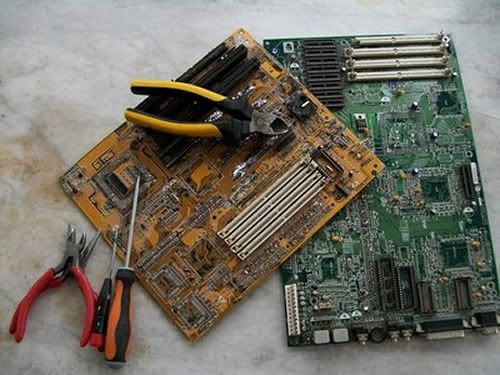
Gold is present in many components of the motherboard: Connectors IDE, slots, PCI Express, PCI, AGP, ISA and other ports, bridges, the CPU socket and slots DIMM (SIMM on older motherboards). All of these connectors are often covered with a thin gold layer thickness of several microns.
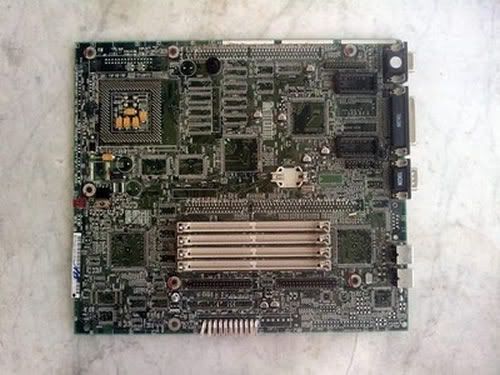
The first phase of our experiment is to remove all these contacts and connectors. We will need wire cutters, pliers and cutter, flat and Phillips screwdrivers, as well as some amount of time.
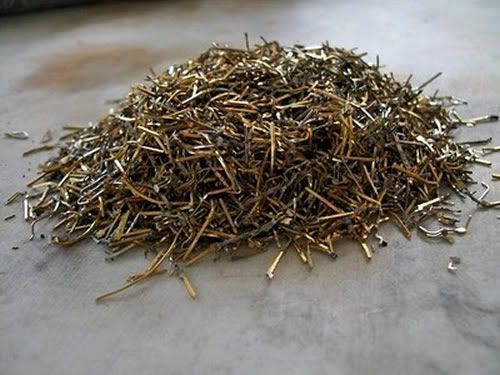
For the experiments need a large number of contacts - they just gave our "donor" motherboards.
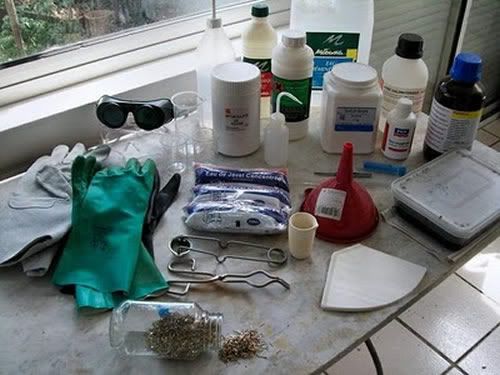
We also need chemicals and tools.
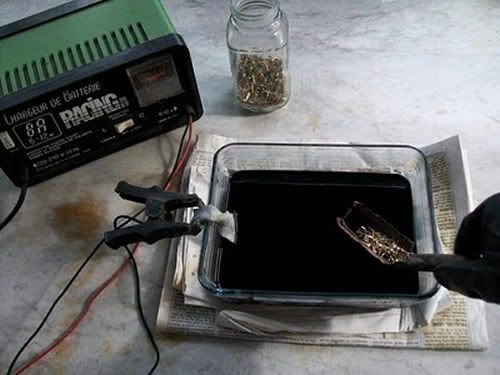
To get a few micrographs of gold deposited on the contacts, we need the electrolytic cell. In the bath poured 95% concentrated sulfuric acid. The cathode is made of lead, the anode - from copper. Contacts (raw materials) are connected to the anode, which we have done in the form of baskets.

When we skip through the cell electric current (we used a conventional battery charger) copper anode (and contacts) is dissolved and deposited on the cathode of lead. Gold is no longer associated with copper, forms a precipitate at the bottom of the cell. It should also be noted that during this process the temperature of the bath significantly increased.
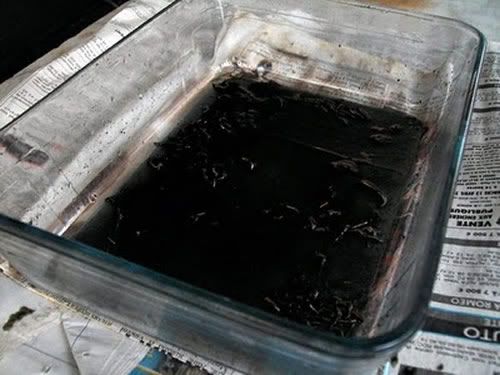
After gold was separated from the contacts, the bath should be given time to settle. Then should be removed as much of sulfuric acid, and then you can begin to dissolve residue in the bottom of the electrolytic cell.
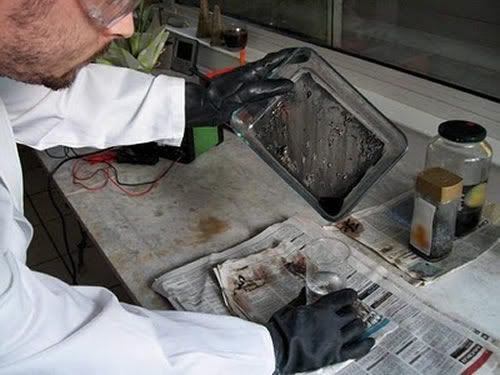
Be careful and always empty the acid into the water, not vice versa! If you make a mistake, then the first drops of water that come into contact with sulfuric acid, instantly evaporate, as acid may then squirt.
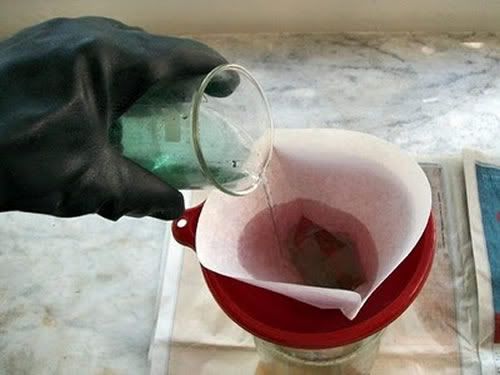
We had a sulfuric acid solution of different metals (including gold) and waste that should be filtered. Why not filter the acid directly, without diluting it? Simply due to the fact that paper filters will not stand in front of concentrated sulfuric acid.

The filter will be a mixture of different metals and waste. Now we are all soluble in a mixture of 35% hydrochloric acid and 5% chlorine bleach (sodium hypochlorite) in a ratio of 2:1. 2 HCl + NaClO -> Cl2 + NaCl + H2O
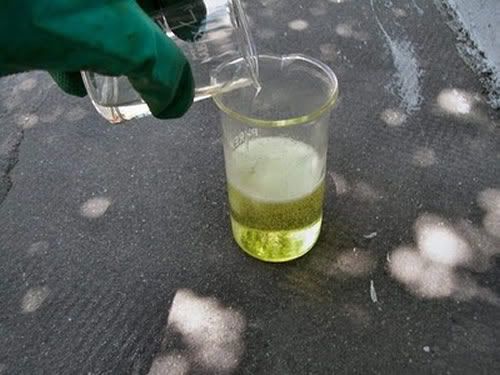
Be careful! This reaction is exothermic, it leads to the release of chlorine gas is very dangerous. Chlorine is used as a chemical weapon in World War II.
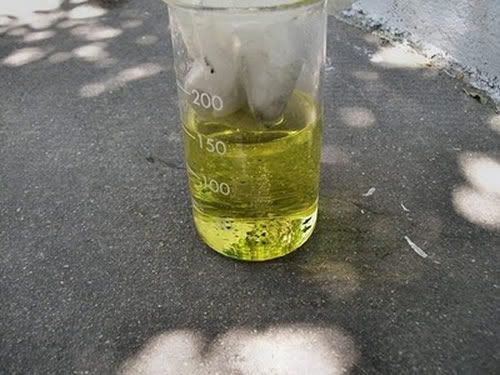
In fact, chlorine, which is separated by mixing hydrochloric acid and chlorine bleach, we just will be used to dissolve gold in a gold chloride III. 2 Au + 3 Cl2 -> 2 AuCl3

Now we need to filter it again. Filter will delay all wastes, leaving only the solution of gold chloride III.

To get the gold metal, we need to rein it in a solution. For this purpose, we use the powdered sodium metabisulfite. In the presence of water gives the sodium metabisulfite sodium bisulfite. Na2S2O2 + H2O -> 2 NaHSO3 sodium bisulfite It will allow us to precipitate the gold. 3 NaHSO3 + 2 AuCl3 + 3 H2O -> 3 NaHSO4 + 6 HCl + 2 Au
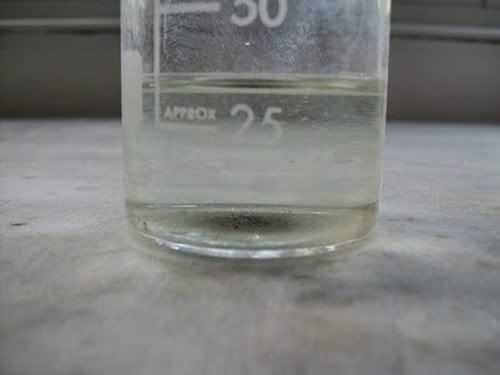
We need to give a solution to settle, and then we get gray powder on the bottom of the beaker. Do not lose any grains - is a metallic gold!
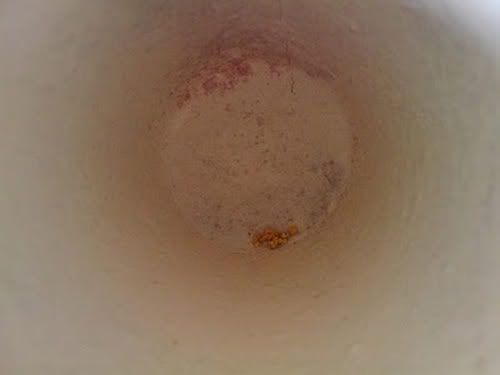
Now we need to melt the powder in the crucible. The melting point of gold is 1064 ° C, so that we will need an oxygen-butane burner.

In the end we got a nice golden pellet! Can we call our process economically viable? Definitely not. It only makes sense on an industrial scale. A small pellet of gold, which we received, it is worth only two or three dollars at current prices. And, frankly, a company to extract gold from old computers that use different technologies and chemicals, which are even more dangerous. But you will agree, it is still interesting to know that you can get gold out of the motherboard in the home. You can also get gold from expansion cards, processors and chipsets.

Gold is present in many components of the motherboard: Connectors IDE, slots, PCI Express, PCI, AGP, ISA and other ports, bridges, the CPU socket and slots DIMM (SIMM on older motherboards). All of these connectors are often covered with a thin gold layer thickness of several microns.

The first phase of our experiment is to remove all these contacts and connectors. We will need wire cutters, pliers and cutter, flat and Phillips screwdrivers, as well as some amount of time.

For the experiments need a large number of contacts - they just gave our "donor" motherboards.

We also need chemicals and tools.

To get a few micrographs of gold deposited on the contacts, we need the electrolytic cell. In the bath poured 95% concentrated sulfuric acid. The cathode is made of lead, the anode - from copper. Contacts (raw materials) are connected to the anode, which we have done in the form of baskets.

When we skip through the cell electric current (we used a conventional battery charger) copper anode (and contacts) is dissolved and deposited on the cathode of lead. Gold is no longer associated with copper, forms a precipitate at the bottom of the cell. It should also be noted that during this process the temperature of the bath significantly increased.

After gold was separated from the contacts, the bath should be given time to settle. Then should be removed as much of sulfuric acid, and then you can begin to dissolve residue in the bottom of the electrolytic cell.

Be careful and always empty the acid into the water, not vice versa! If you make a mistake, then the first drops of water that come into contact with sulfuric acid, instantly evaporate, as acid may then squirt.

We had a sulfuric acid solution of different metals (including gold) and waste that should be filtered. Why not filter the acid directly, without diluting it? Simply due to the fact that paper filters will not stand in front of concentrated sulfuric acid.

The filter will be a mixture of different metals and waste. Now we are all soluble in a mixture of 35% hydrochloric acid and 5% chlorine bleach (sodium hypochlorite) in a ratio of 2:1. 2 HCl + NaClO -> Cl2 + NaCl + H2O

Be careful! This reaction is exothermic, it leads to the release of chlorine gas is very dangerous. Chlorine is used as a chemical weapon in World War II.

In fact, chlorine, which is separated by mixing hydrochloric acid and chlorine bleach, we just will be used to dissolve gold in a gold chloride III. 2 Au + 3 Cl2 -> 2 AuCl3

Now we need to filter it again. Filter will delay all wastes, leaving only the solution of gold chloride III.

To get the gold metal, we need to rein it in a solution. For this purpose, we use the powdered sodium metabisulfite. In the presence of water gives the sodium metabisulfite sodium bisulfite. Na2S2O2 + H2O -> 2 NaHSO3 sodium bisulfite It will allow us to precipitate the gold. 3 NaHSO3 + 2 AuCl3 + 3 H2O -> 3 NaHSO4 + 6 HCl + 2 Au

We need to give a solution to settle, and then we get gray powder on the bottom of the beaker. Do not lose any grains - is a metallic gold!

Now we need to melt the powder in the crucible. The melting point of gold is 1064 ° C, so that we will need an oxygen-butane burner.

In the end we got a nice golden pellet! Can we call our process economically viable? Definitely not. It only makes sense on an industrial scale. A small pellet of gold, which we received, it is worth only two or three dollars at current prices. And, frankly, a company to extract gold from old computers that use different technologies and chemicals, which are even more dangerous. But you will agree, it is still interesting to know that you can get gold out of the motherboard in the home. You can also get gold from expansion cards, processors and chipsets.






0 comments
Post a Comment